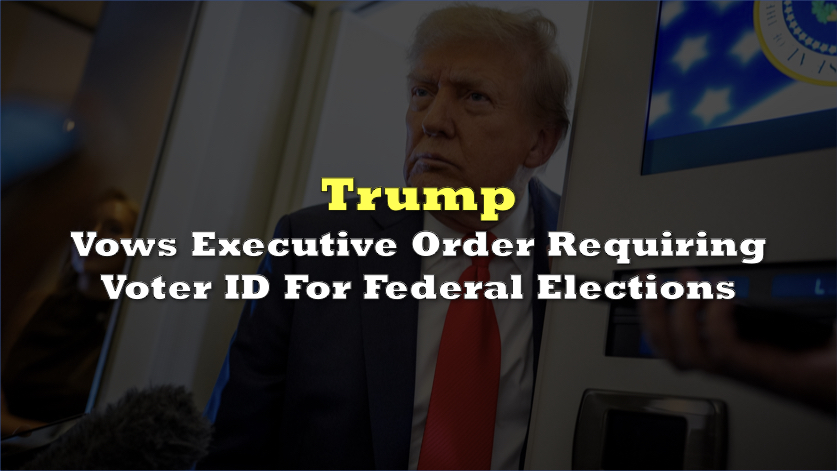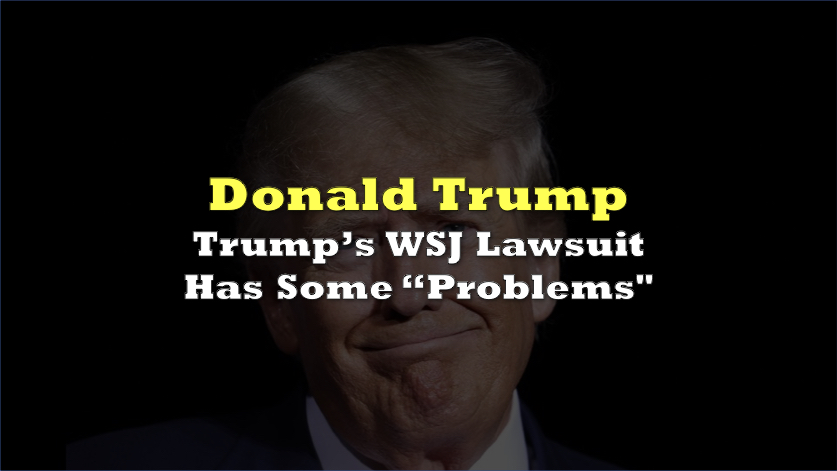Some say it’s the day the law died; some say it’s a clear display of separation of powers. But the U.S. Supreme Court has recently ruled that former President Donald Trump had presumptive immunity for actions taken as part of his official duties during his presidency. This ruling comes amidst various legal challenges facing Trump, including federal and state charges related to efforts to overturn the 2020 election and the handling of classified documents.
BREAKING: U.S. Supreme Court rules Donald Trump has presumptive immunity for official acts, no immunity for unofficial acts. Aka immune if it was on the job not immune when not on job.
— Intelschizo (@Schizointel) July 1, 2024
So with this ruling Biden can have Trump arrested for not liking double chocolate chunk ice… pic.twitter.com/ZV3BA56cXL
The court’s opinion stated, “Under our constitutional structure of separated powers, the nature of Presidential power entitles a former President to absolute immunity from criminal prosecution for actions within his conclusive and preclusive constitutional authority. And he is entitled to at least presumptive immunity from prosecution for all his official acts. There is no immunity for unofficial acts.”
Chief Justice John Roberts, in his detailed opinion, wrote that the president of the United States may not be prosecuted for duties carried out under his constitutional authority but may be prosecuted for all other actions.
“The outer perimeter of a president’s duties as claimed by the defense were unclear—not deeming them ‘official’ or ‘unofficial,’ and so kicked the decisions regarding these details to the lower courts,” he wrote.
The point of Roberts not telling us what "unofficial" or "official" actually means is that it gives him leeway to make it up later, depending on who wins the next election. https://t.co/6aocS0Zhhv
— Elie Mystal (@ElieNYC) July 1, 2024
Implications
This decision holds significant implications for the multiple legal cases Trump faces. In Georgia, he is charged with trying to corrupt the state’s election results in 2020. The former president has previously claimed that his conduct is immune from prosecution because he was acting as president. The Supreme Court’s ruling may influence Judge Scott McAfee’s decision on this matter.
Additionally, in Florida, Trump is charged with hoarding classified documents in his home after leaving office. U.S. District Judge Aileen Cannon, who has not yet ruled on Trump’s motion claiming immunity for transferring classified records to Mar-a-Lago, will now have to consider the Supreme Court’s decision.
Jessica Roth, a professor at Cardozo Law School and a former federal prosecutor, remarked, “It certainly raises whole new avenues for litigation there. It certainly adds additional avenues for delay.”
The ruling also has immediate implications for Trump’s federal election case in Washington, D.C., where special counsel Jack Smith is attempting to prosecute Trump for allegedly trying to overturn the 2020 election. The Supreme Court’s decision complicates Smith’s efforts, and Trump is expected to use the ruling to challenge the charges against him.
Where is the line?
Moreover, the Supreme Court’s decision does not dismiss all actions related to the 2020 election as immune. The high court left open the question of whether Trump’s efforts to pressure state officials to reverse certified election results can be treated as “official” conduct. Therefore, charges against Trump for urging Georgia Secretary of State Brad Raffensperger to “find” enough votes for him to prevail in the state may still proceed.
The broader implications of this ruling extend beyond Trump, potentially affecting the presidency itself. Republicans have suggested that their allies in government consider charging President Joe Biden with crimes for various policy decisions. However, these actions would clearly be beyond the reach of prosecutors under the Supreme Court’s analysis.
Justice Sonia Sotomayor, in her dissenting opinion, highlighted the potential dangers of the ruling, stating, “Orders the Navy’s Seal Team 6 to assassinate a political rival? Immune. Organizes a military coup to hold onto power? Immune. Takes a bribe in exchange for a pardon? Immune. Immune, immune, immune.”
Sotomayor's dissent:
— Adam Klasfeld (@KlasfeldReports) July 1, 2024
"Orders the Navy’s Seal Team 6 to assassinate a political rival? Immune. Organizes a military coup to hold onto power? Immune. Takes a bribe in exchange for a pardon? Immune. Immune, immune, immune." pic.twitter.com/oueMPuLnDF
Following the ruling, Biden condemned the decision in a surprise address, stating, “The power of the office will no longer be constrained by the law, even including the Supreme Court of the United States. The only limits will be self-imposed by the president alone.”
The president, who is facing Trump in a presidential rematch in 2024, emphasized that the decision undermines the principle that “no one, not even the president, is above the law.” He warned, “For all practical purposes, today’s decision almost certainly means that there are virtually no limits on what a president can do.”
“Legal coup”
The decision has sparked widespread debate about the limits of presidential power and accountability. CREW President Noah Bookbinder, a former federal corruption prosecutor, called the decision “dangerous and devastating,” stating, “Donald Trump’s attempts to claim absolute immunity do not hold up to even the barest scrutiny, but they have now largely been validated by our nation’s highest court. This threatens our system of democratic checks and balances by placing presidents above the rule of law.”
Despite the Supreme Court’s decision, Trump still faces charges for some of his actions to overturn the 2020 election and inciting the insurrection. The District Court is expected to move forward to determine where immunity does and doesn’t apply in order to try the case this year. Bookbinder stressed, “Accountability cannot wait.”
The ruling also impacts Trump’s New York case, where he was found guilty of falsifying records to cover up a hush money payment to a porn star. Trump’s lawyers have reportedly asked the judge to toss out the jury verdict, citing the immunity decision.
Mark Joseph Stern, a legal analyst, remarked, “The Supreme Court’s conservative supermajority establishes new principles—located nowhere in the text of the Constitution—that permanently shield the president from meaningful accountability when he weaponizes the tools of his office for criminal purposes. That is shocking.”
I just want to take a step back and say that I think the Supreme Court just fundamentally altered the structure and nature of democracy in America. It awards the president the measure of power and immunity that is much, much closer to a king or emperor than an elected official. https://t.co/HB0Tvb9qvS
— Mark Joseph Stern (@mjs_DC) July 1, 2024
This decision has led to criticism from various legal experts and commentators. Laurence Tribe, a constitutional law professor, posted on X, “Of the 6-Justice majority in today’s terrible immunity decision, two justices (Thomas, Alito) were violating federal law (28 USC 455) by not recusing from the case and three (Gorsuch, Kavanaugh, Barrett) were appointed by the man whom the decision essentially immunized. Hmmm.”
Of the 6-Justice majority in today’s terrible immunity decision, two justices (Thomas, Alito) were violating federal law (28 USC 455) by not recusing from the case and three (Gorsuch, Kavanaugh, Barrett) were appointed by the man whom the decision essentially immunized. Hmmm. 🤔
— Laurence Tribe 🇺🇦 ⚖️ (@tribelaw) July 2, 2024
Tristan Snell, a legal analyst, criticized the Supreme Court’s interpretation, posting, “No no no, SCOTUS. Do NOT try to quote Alexander Hamilton to support this horrendous immunity decision. Hamilton’s Federalist No. 77 SPECIFICALLY cites ‘prosecution in the common course of law’ as a check on the president. And you amateur historians just ignored it. ‘Original intent’ my ass. You’re making it up as you go, in whatever way suits you.”
He added that Sotomayor’s dissent “gets [Federalist No. 77] right.”
No no no, SCOTUS. Do NOT try to quote Alexander Hamilton to support this horrendous immunity decision.
— Tristan Snell (@TristanSnell) July 1, 2024
Hamilton's Federalist No. 77 *SPECIFICALLY* cites "prosecution in the common course of law" as a check on the president.
And you amateur historians just ignored it.
"Original…
Andrew Coyne, a political commentator, drew a stark parallel between historical and legal events, saying, “Jan 6 was the illegal coup. Today was the legal coup — the coup that made the illegal coup legal. The first was a coup against democracy. The second is a coup against the rule of law — without which democratic government is impossible.”
Jan 6 was the illegal coup. Today was the legal coup — the coup that made the illegal coup legal.
— Andrew Coyne 🇺🇦🇮🇱 (@acoyne) July 1, 2024
Even more pointedly, legal analyst Marcy Wheeler (known as @emptywheel on X) highlighted the possible repercussions of the ruling, quoting it: “Testimony or private records of the President or his advisers probing such conduct may not be admitted as evidence at trial.”
Holy shit: "Testimony or private records of the President or his advisers probing such conduct may not be admitted as evidence at trial."
— emptywheel (chicklet) (@emptywheel) July 1, 2024
Matt Stoller, a political analyst, added a historical perspective, analyzing that the Supreme Court decision “retroactively made Watergate legal,” referring to the major political scandal involving a break-in at the Democratic National Committee headquarters and the subsequent cover-up by the Nixon administration, leading to then-President Richard Nixon’s resignation.
For kicks the Supreme Court retroactively made Watergate legal.
— Matt Stoller (@matthewstoller) July 1, 2024
Social media spaces had a field day following the ruling, with most Americans satirically highlighting the implications of this groundbreaking ruling by the so-called last bastion of democracy.
Donald Trump: I’ll be a dictator on day one.
— The Lincoln Project (@ProjectLincoln) July 1, 2024
Supreme Court: That's covered.
The Supreme Court announcing that presidents are basically now kings during July 4th week is quite a choice.
— Bradford Pearson (@BradfordPearson) July 1, 2024
BREAKING: The Supreme Court has ruled that the American Revolution was a waste of time.
— KD 📚🌎🌊🇺🇸 (@kdnerak33) July 1, 2024
Me every time a new supreme court decision comes out lately pic.twitter.com/5uTQ8OvtcK
— Jordan Grimes 🚰 (@cafedujord) July 1, 2024
Do you think I can ask my law school for a refund because like there is no law anymore lol
— Andrew Strauss (@straussanator) July 1, 2024
Biden concluded his address by urging Americans to render their judgment about Donald Trump’s behavior at the polls, saying, “The American people must decide if Donald Trump’s embrace of violence to preserve his power is acceptable.” He emphasized the importance of accountability and maintaining the integrity of the presidential office.
In response to Biden’s condemnation, Trump praised the ruling on his social media platform TruthSocial and predicting that the criminal cases against him would be dismissed.
“The Supreme Court decision is brilliantly written and wise. It’s clear that the charges against me will disappear now,” he wrote.
Information for this briefing was found via Time, Politico, and the sources mentioned. The author has no securities or affiliations related to this organization. Not a recommendation to buy or sell. Always do additional research and consult a professional before purchasing a security. The author holds no licenses.









